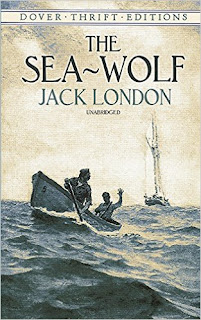There are a lot of facts from the author’s life, but the most important things are:
1) Jack London was born as John Griffith Chaney on January 12, 1876 in the slums of San Francisco.
2) London's mother was a spiritualist and his biological father was an astrologist.
Flora Wellman came from a wealthy home in Massillon, Ohio. She believed she could communicate with the dead, a belief called Spiritualism that reached heights of popularity as she grew up in the 1840s. She also believed she could predict the future. When she was fifteen, the panic of 1858 destroyed her father's finances, and she left home. During the Civil War she was a volunteer with the Sanitary Commission, but nothing else is known about where and how she lived between the years 1860 and 1870. In the early 1870s she took up with William Chaney, a traveling astrologer, in Seattle, Washington. In 1874 the couple moved to San Francisco where Flora brought in money performing seances and teaching music, and William gave lectures on astrology.
3) While she was pregnant, London's mother tried to kill herself.
4) Flora and William's "domestic infelicity" was recorded in the San Francisco Chronicle.
5) London's foster mother was a former slave named, Virginia Prentiss.
6) Jack London was a 15-year-old oyster pirate.
7) London wrote 1,000 words every day.
8) Jack London’s San Francisco home has a collection of some of the 600 rejections he received before he sold a single story.
9) Like many aspiring writers, young Jack London had many other jobs. These included paperboy, journalist, gold-miner, coal-shoveller, and vagrant (not much of an occupation, and it landed him in jail after he went to see Niagara Falls by moonlight).
10) He was the first author in the world to become a millionaire from his writing.
11) Nobody knows for sure whether he intended to kill himself or not.
Also it is interesting to think about his the most famous statements:
Jack London quotes :
“You can't wait for inspiration. You have to go after it with a club.”
― Jack London
“I would rather be a superb meteor, every atom of me in magnificent glow, than a sleepy and permanent planet.”
― Jack London
"I'd rather sing one wild song and burst my heart with it, than live a thousand years watching my digestion and being afraid of the wet.”
― Jack London, The Turtles of Tasman
“The Wild still lingered in him and the wolf in him merely slept.”
― Jack London, White Fang
“He was mastered by the sheer surging of life, the tidal wave of being, the perfect joy of each separate muscle, joint, and sinew in that it was everything that was not death, that it was aglow and rampant, expressing itself in movement, flying exultantly under the stars.”
― Jack London, The Call of the Wild
"A bone to the dog is not charity. Charity is the bone shared with the dog, when you are just as hungry as the dog.”
― Jack London
“I would rather be ashes than dust!
I would rather that my spark should burn out in a brilliant blaze than it should be stifled by dry-rot.
I would rather be a superb meteor, every atom of me in magnificent glow, than a sleepy and permanent planet.
The function of man is to live, not to exist.
I shall not waste my days trying to prolong them.
I shall use my time.”
― Jack London
"Don't loaf and invite inspiration; light out after it with a club.”
― Jack London
"Life is not always a matter of holding good cards, but sometimes, playing a poor hand well.”
― Jack London


















